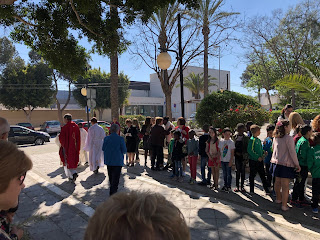St. Clare and the spiritual meaning of virginity
My spirituality class ended last Friday, but there's more to say! I'll keep posting some of the "lessons" I learned in teaching this class for a while. At least, until I'm finished with them.
We had a fascinating conversation one day about the image of virginity in the Catholic tradition. It came up because we read one of St. Clare of Assisi's letters to Agnes of Prague. Clare writes a number of letters to this noblewoman ("daughter of the most excellent and illustrious king of Bohemia"), and this one was written in 1234. She uses quotations and ideas from the Office of the Feast of St. Agnes, Virgin and Martyr.
Now, what's all this "virginity" talk about?
One of my students started a conversation about how it's sometimes easy to disregard images that have little meaning to us, and that we lose some of the richness of the spiritual writings of our tradition when we do so.
I think he's right. However, I have some concerns about this.
One concern comes from our contemporary church. In Vatican II, the bishops were cautious to articulate the relative equality of all ways of living, of all vocations, whether married, single, priesthood, or religious. The "priesthood of all the faithful" and the "universal call to holiness" underline the concept that ALL walks of life are called to follow God, and that no single vocation is holier than any other.
The problem with the use of the image of virginity in this light is that for so long it was taught that the vocations to celibacy -- especially that to priesthood -- were higher than the call to marriage and family. (If you don't believe me, take a look at this image from the Baltimore Catechism!)
A second problem is that "virginity" tends to be applied unequally to women more than to men.
So, what is the benefit of the image of virginity? Clare above refers to being "unspotted and unsullied." She goes on to say of the Lord Jesus Christ, "Whom in loving, You are chaste; in touching, You become more pure; in embracing, You are a virgin." Additionally, virginity is paired in this writing with the choice of poverty and the rejection of worldly honors. It seems it is part of an all-around rejection of worldly goods in favor of unwavering commitment to Jesus.
In that sense, yes, virginity offers an image that might be helpful for some people. It represents a sacrifice of physical desire in favor of an undistracted, pure desire for union with God. In this, if we remember the high esteem placed on having a family, then the sacrifice of virginity takes on a meaning that doesn't diminish the physicality of our human nature or the holiness of parenthood and married life. When we revere our human physical selves, we also then begin to understand more clearly this sacrifice this points to.
Really, to me, this means both vocations are important, both are meaningful, and both lead to holiness.
 |
| image from discerninghearts.com |
We had a fascinating conversation one day about the image of virginity in the Catholic tradition. It came up because we read one of St. Clare of Assisi's letters to Agnes of Prague. Clare writes a number of letters to this noblewoman ("daughter of the most excellent and illustrious king of Bohemia"), and this one was written in 1234. She uses quotations and ideas from the Office of the Feast of St. Agnes, Virgin and Martyr.
"For, though You (Agnes), more than others, could have enjoyed the magnificence, honor, and dignity of the world and could have been married to the illustrious Emperor with splendor befitting You and His Excellency, You have rejected all these things and chosen with Your whole heart and soul a life of holy poverty and bodily want. Thus You took a spouse of a more noble stock, Who will keep Your virginity ever unspotted and unsullied, the Lord Jesus Christ...."
Now, what's all this "virginity" talk about?
One of my students started a conversation about how it's sometimes easy to disregard images that have little meaning to us, and that we lose some of the richness of the spiritual writings of our tradition when we do so.
I think he's right. However, I have some concerns about this.
One concern comes from our contemporary church. In Vatican II, the bishops were cautious to articulate the relative equality of all ways of living, of all vocations, whether married, single, priesthood, or religious. The "priesthood of all the faithful" and the "universal call to holiness" underline the concept that ALL walks of life are called to follow God, and that no single vocation is holier than any other.
The problem with the use of the image of virginity in this light is that for so long it was taught that the vocations to celibacy -- especially that to priesthood -- were higher than the call to marriage and family. (If you don't believe me, take a look at this image from the Baltimore Catechism!)
A second problem is that "virginity" tends to be applied unequally to women more than to men.
So, what is the benefit of the image of virginity? Clare above refers to being "unspotted and unsullied." She goes on to say of the Lord Jesus Christ, "Whom in loving, You are chaste; in touching, You become more pure; in embracing, You are a virgin." Additionally, virginity is paired in this writing with the choice of poverty and the rejection of worldly honors. It seems it is part of an all-around rejection of worldly goods in favor of unwavering commitment to Jesus.
In that sense, yes, virginity offers an image that might be helpful for some people. It represents a sacrifice of physical desire in favor of an undistracted, pure desire for union with God. In this, if we remember the high esteem placed on having a family, then the sacrifice of virginity takes on a meaning that doesn't diminish the physicality of our human nature or the holiness of parenthood and married life. When we revere our human physical selves, we also then begin to understand more clearly this sacrifice this points to.
Really, to me, this means both vocations are important, both are meaningful, and both lead to holiness.



Comments